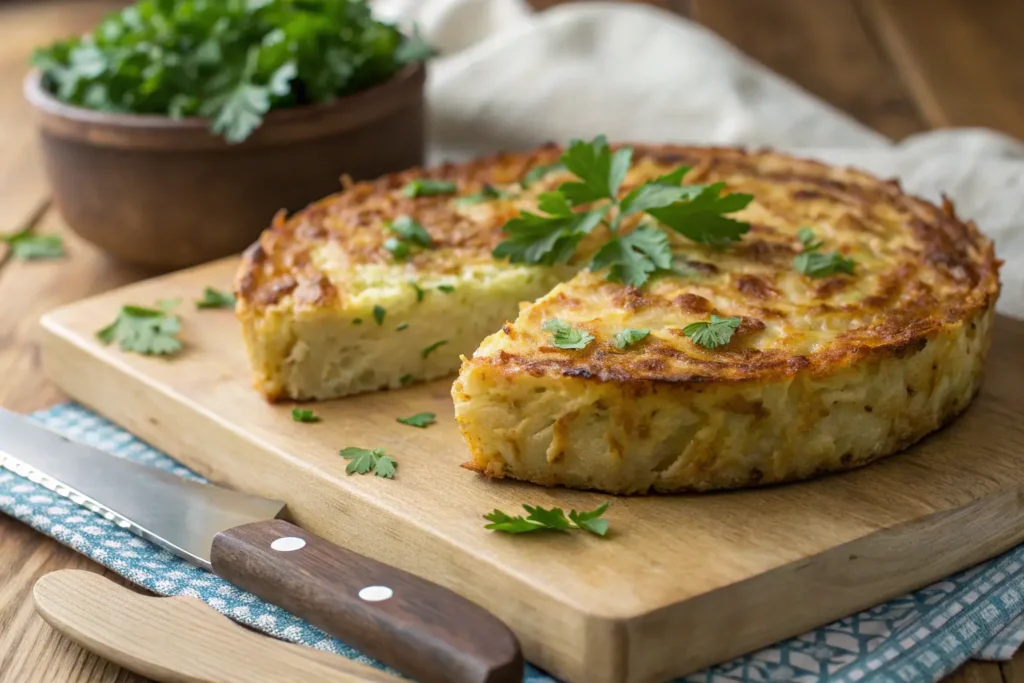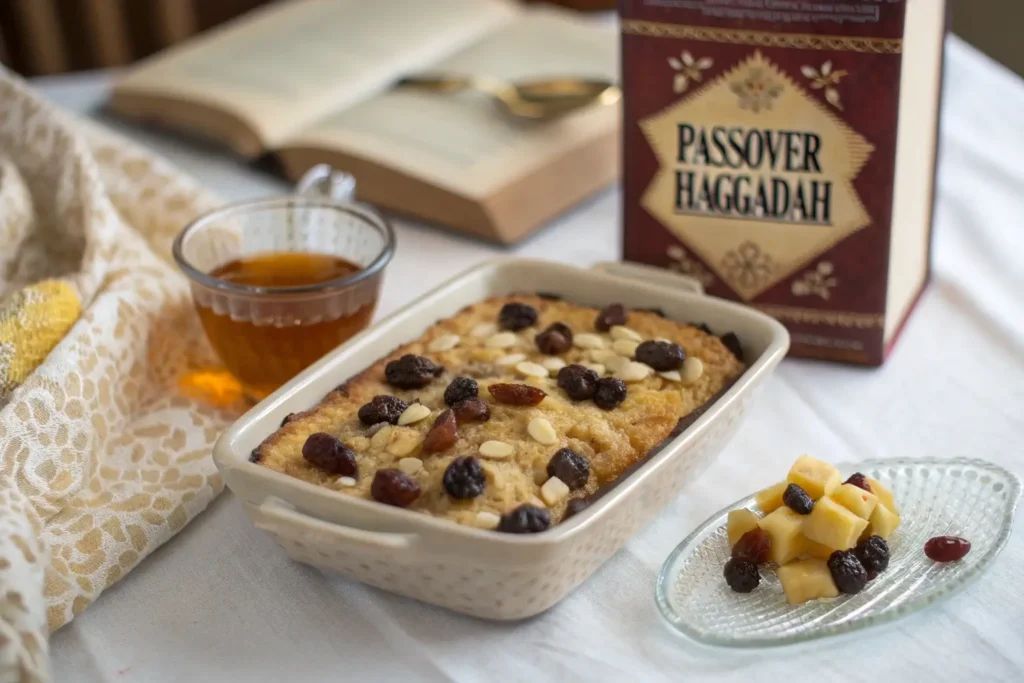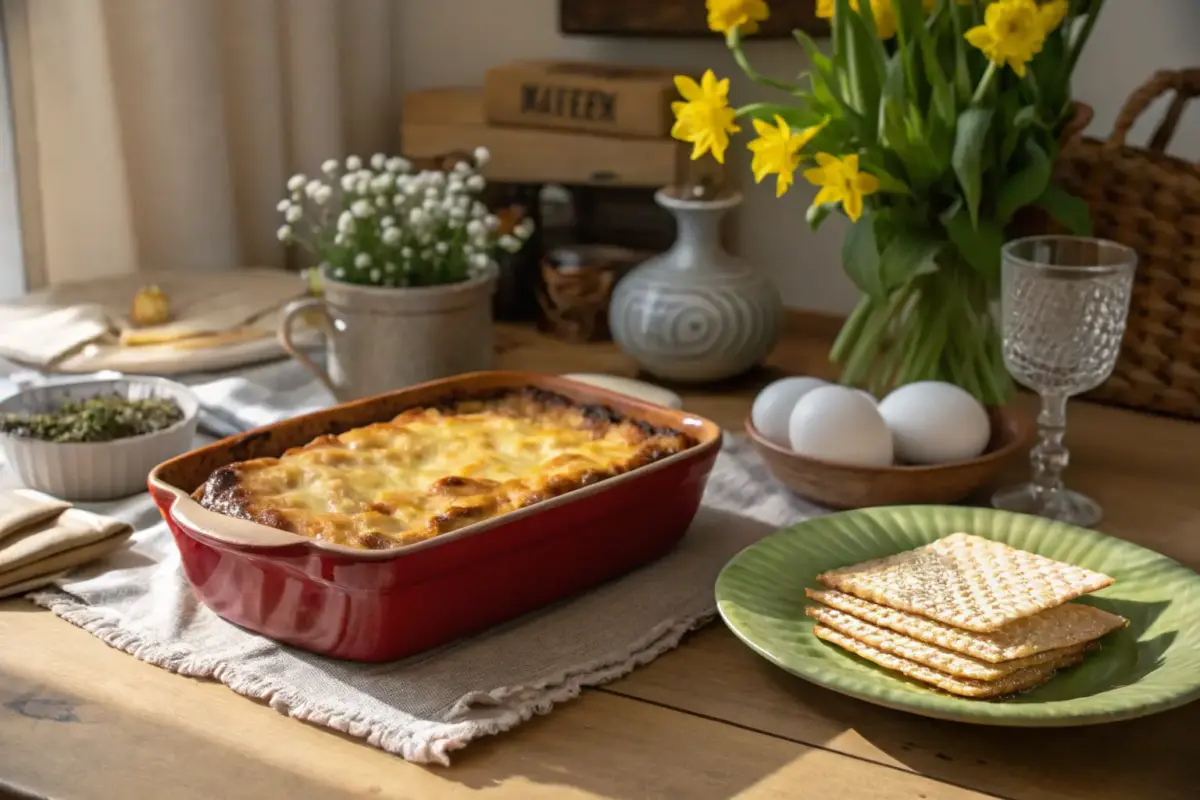Introduction
Passover, or Pesach, is a significant Jewish holiday filled with traditions, storytelling, and, of course, delicious food. However, if you’re wondering, “Can you eat kugel on Passover?”, the answer depends on how it’s prepared. Kugel is a much-loved dish in Jewish cuisine, but not every kugel automatically meets Passover dietary laws. Let’s explore the rules and see how kugel fits into this meaningful holiday.
Understanding the Basics of Passover Dietary Laws
What is Chametz and Why Is It Forbidden?
To answer the question, “Can you eat kugel on Passover?” we first need to discuss chametz. Chametz refers to leavened foods made from wheat, barley, rye, oats, or spelt that have come into contact with water and risen. Bread, pasta, and most baked goods fall into this category. During Passover, chametz is prohibited to commemorate the Israelites’ hasty departure from Egypt, where they didn’t have time for their bread to rise.
Even a small trace of chametz can disqualify a dish, which is why Jewish households carefully clean their homes before Passover. This deep-cleaning ensures no chametz accidentally makes its way into the kitchen or onto the table.
For instance, if you’re wondering whether potatoes fit into Passover guidelines, check out this discussion: Can Jews Eat Potatoes During Passover?.
Kosher Certification for Passover Foods
For kugel to be part of your Passover menu, it must be made with kosher-for-Passover ingredients. Certified kosher-for-Passover products will often feature labels like “OU-P” or “Kosher for Passover.” These certifications guarantee that the food is chametz-free and prepared according to Passover dietary laws.
Many traditional kugel recipes, such as noodle kugel, use egg noodles made from wheat flour, which is considered chametz. However, alternative ingredients, like potato starch or matzo, can be used to create kugel variations that are kosher for Passover.
What Is Kugel?
Origins and Cultural Significance
Kugel, a beloved staple of Jewish cuisine, dates back centuries. This dish has roots in Eastern Europe, where it began as a savory pudding. Over time, kugel evolved to include ingredients like noodles, potatoes, and vegetables, making it a versatile dish suitable for various occasions.
When you ask, “Can you eat kugel on Passover?” it’s worth noting that kugel isn’t just food—it’s a cultural symbol. It represents comfort, tradition, and family, often appearing on holiday tables and during special gatherings. Whether sweet or savory, kugel has earned its place as a cherished part of Jewish culinary heritage.
For those looking to add variety to their Seder table, a creative take like Passover Potato Pie is worth considering.
Types of Kugel in Jewish Cuisine
To better understand if you can eat kugel on Passover, let’s look at its most popular variations:
- Noodle Kugel: A sweet or savory dish typically made with egg noodles. Sweet versions include ingredients like raisins and cinnamon, while savory versions often feature onions and garlic.
- Potato Kugel: A Passover-friendly favorite made with grated potatoes, eggs, and onions. Its crispy edges and soft interior make it a hit at the Seder table.
- Rice Kugel: A less common but gluten-free variation, often sweetened with fruits or spices.
- Vegetable Kugel: A lighter option made with carrots, zucchini, or spinach for added nutrition and color.
Each type of kugel brings something unique to the table, but not all are automatically suitable for Passover. Next, we’ll dive deeper into the details to determine which kugels pass the test.
Is Traditional Kugel Kosher for Passover?
Noodle Kugel and Chametz Restrictions
When asking, “Can you eat kugel on Passover?” the most common version that comes to mind is noodle kugel. Unfortunately, traditional noodle kugel is not kosher for Passover. This is because the egg noodles used in the recipe are made from wheat flour, a chametz ingredient forbidden during the holiday.
However, don’t give up hope! You can make a Passover-friendly noodle kugel by swapping out regular noodles for kosher-for-Passover alternatives. Some families use matzo meal, potato starch noodles, or other approved substitutes to recreate this dish while adhering to dietary laws. With a few tweaks, you can enjoy the flavors of noodle kugel without breaking any rules.
Dairy vs. Pareve Kugels and Passover Rules
Another factor to consider when answering, “Can you eat kugel on Passover?” is whether your kugel is dairy or pareve (neutral). Sweet kugels often contain dairy ingredients like sour cream, cream cheese, or milk, which are fine for a dairy meal. However, if you’re serving kugel at a meat-based Seder meal, you’ll need a pareve version.
Pareve kugels, like potato kugel or vegetable kugel, are incredibly versatile and fit seamlessly into Passover meals. These dishes are made without dairy, so they can be paired with meat-based dishes while still adhering to kosher rules. This flexibility is one reason pareve kugels are so popular during the holiday.
Alternative Passover-Friendly Kugel Recipes
Potato Kugel: A Classic Choice

If you’re wondering, “Can you eat kugel on Passover?” the answer is an enthusiastic yes—especially when it comes to potato kugel. This dish is naturally chametz-free and requires no special adjustments to fit Passover dietary laws. Made with grated potatoes, eggs, onions, and oil, potato kugel is a staple at Passover Seders.
Seasoned with salt and pepper and baked to golden perfection, potato kugel is comforting, flavorful, and pairs perfectly with traditional dishes like brisket or roasted chicken. It’s no wonder this kugel variation has stood the test of time as a Passover favorite.
Matzo-Based Kugel Variants

For a kugel that’s chametz-free and completely kosher for Passover, try matzo kugel. This version uses broken pieces of matzo instead of noodles, making it both creative and compliant. Whether you prefer it sweet or savory, matzo kugel offers endless possibilities to suit your taste buds.
For a sweet option, mix the matzo with ingredients like raisins, cinnamon, honey, and apples. For a savory twist, add sautéed onions, fresh herbs, and a touch of garlic. No matter which version you choose, matzo kugel is a delicious way to keep the kugel tradition alive during Passover.
Vegetable Kugel for a Healthier Option
If you’re looking for a lighter dish, vegetable kugel is an excellent choice. This variation uses shredded vegetables like carrots, zucchini, sweet potatoes, or spinach as its base, making it both nutritious and Passover-friendly. The natural flavors of the vegetables shine through, complemented by simple seasonings and a few eggs to bind it all together.
Vegetable kugel is not only kosher for Passover but also a vibrant addition to your Seder table. Its colorful presentation and fresh flavors make it a standout dish that everyone will appreciate.
Creative Twists on Passover Kugels
Can you eat kugel on Passover if you want to try something unconventional? Absolutely! Passover kugel recipes are highly adaptable, allowing you to experiment with new ingredients while staying kosher. For example, consider a sweet apple kugel made with thinly sliced apples, matzo meal, and a sprinkle of cinnamon and sugar.
Or, try a savory spinach kugel with garlic, onions, and fresh dill for a bold, herbaceous flavor. With the right kosher-for-Passover ingredients, you can create kugel variations that are both exciting and compliant with holiday rules.
Tips for Making Kugel Kosher for Passover
Selecting Kosher Ingredients
When making kugel for Passover, choosing the right ingredients is essential. Always check for a “Kosher for Passover” certification on products like eggs, oil, and matzo meal. This certification ensures that the item complies with Passover dietary laws and is free from chametz. Double-check the labels on spices and other pantry items, as some common seasonings can contain traces of chametz.
If you’re using vegetables, like potatoes or carrots, wash them thoroughly and peel them to remove any impurities. It might seem tedious, but these small steps keep your kugel compliant with Passover traditions.
Preparing Your Kitchen for Passover Cooking
Before you even think about preheating the oven, make sure your kitchen is ready for Passover. This means removing all chametz, cleaning surfaces, and using cookware and utensils that are designated specifically for Passover. For many families, this preparation is a cherished tradition in itself, signaling the start of the holiday.
For kugel, use a baking dish and mixing tools that haven’t come into contact with chametz. If you’re unsure, it’s always a good idea to consult with your rabbi or community leader for guidance on kitchen preparation.
Buying Pre-Made Kugel for Passover
How to Identify Kosher-for-Passover Products
Not everyone has time to make kugel from scratch, and that’s okay! Many grocery stores and specialty shops sell pre-made kugels that are kosher for Passover. To identify these, look for labels that say “Kosher for Passover” or certifications like “OU-P,” “Star-K P,” or other recognized symbols. These labels ensure the product was made with Passover-friendly ingredients in a chametz-free facility.
While shopping, take a moment to read the ingredients list carefully. Some pre-made kugels might include additives or preservatives that aren’t suitable for Passover. Trust me, a little extra attention here saves you from any last-minute surprises at the Seder table.
Reliable Certification Labels to Look For
If you’re new to kosher shopping, it helps to know which certification labels are trustworthy. The most common ones include:
- OU-P: Certified by the Orthodox Union for Passover.
- Star-K P: Another widely recognized Passover certification.
- CRC-P: Certified by the Chicago Rabbinical Council.
These certifications are your assurance that the kugel (and any other product) meets Passover standards. If you’re ever unsure, don’t hesitate to ask store staff or consult a reliable Passover shopping guide.
Serving Kugel at a Passover Seder
Pairing Kugel with Traditional Dishes
Kugel is a versatile dish that pairs beautifully with classic Seder staples. For example, a savory potato kugel complements brisket or roasted chicken, while a sweet matzo kugel pairs well with charoset or fresh fruit. The key is to balance flavors so that your kugel enhances the overall meal without overpowering it.
Don’t be afraid to get creative! If you’re serving multiple kugel varieties, label them clearly so guests know what to expect. Trust me, your Seder attendees will thank you when they can choose their favorite without any guesswork.
Ensuring Everyone’s Dietary Compliance
Passover often brings together family and friends with diverse dietary needs. Some guests may require gluten-free options, while others might prefer vegetarian dishes. Offering a variety of kugels—such as a gluten-free vegetable kugel or a pareve potato kugel—ensures everyone can enjoy the meal.
Also, keep portion sizes in mind. Kugel is delicious but filling, so serving smaller portions alongside other Seder staples helps everyone enjoy the full meal without feeling stuffed. It’s all about finding that perfect balance.
FAQs
Is egg noodle kugel kosher for Passover?
Traditional egg noodle kugel is not kosher for Passover because egg noodles are made from wheat flour, which is chametz. However, you can make a Passover-friendly version using matzo meal or kosher-for-Passover noodles.
Are egg noodles ok for Passover?
No, regular egg noodles are not allowed during Passover as they contain chametz. Look for kosher-for-Passover alternatives, often made with potato starch or matzo meal.
What holiday is kugel served on?
Kugel is commonly served during Jewish holidays such as Passover, Rosh Hashanah, and Hanukkah. It’s also a staple at Shabbat dinners and family celebrations.
What foods are forbidden on Passover?
Foods containing chametz—such as bread, pasta, and most baked goods—are forbidden on Passover. This includes anything made from wheat, barley, rye, oats, or spelt that has risen. Additionally, some communities avoid legumes, rice, and corn, depending on tradition.
Conclusion
So, can you eat kugel on Passover? Absolutely, as long as it’s made with the right ingredients and follows Passover dietary laws. Whether you stick to a classic potato kugel, try a creative matzo-based recipe, or buy a pre-made option, kugel can be a delicious addition to your Passover table. By paying attention to certifications, preparing your kitchen, and considering your guests’ needs, you’ll create a meal that’s both meaningful and memorable. Happy Passover!


2 thoughts on “Can You Eat Kugel on Passover? A Complete Guide to Keeping It Kosher”